|
|
 |
|
Welcome to Central Philippines...
|

|
ANNOUNCEMENT:
The Island-Province of Bohol has been prominently featured in the December 2006 issue of
the prestigious travel publication- "ISLANDS" Magazine.....
|
|

|
|
|
|
|
|
|

The "Chocolate Hills"
of Bohol
The Chocolate Hills are considered one of Philippine's natural wonders and Bohol is often referred
to as the Jewel of the Philippines. They are hills made of limestone leftover from coral reefs during the ice age when
the island was submerged. They turn brown during the summer, hence their name.
Bohol is a popular tourist destination with its beaches and resorts. The Chocolate Hills, numerous mounds of limestone formations, is the most popular attraction. The island of Panglao, located just southwest of Tagbilaran
City, is home to some of the finest beaches in the country. The Philippine Tarsier, considered by some to be the smallest primates, is indigenous to the island.
Most beaches are of white sand. The sand is often of such high quality that it is exported to
other beaches in the world. The most well known of these beaches are in Panglao Island, and there, numerous islets have similar, yet untouched and pristine beaches.
The Loboc River is the most famous, running from the southeastern coast to the center of the island. It
is famous for its River Cruise going up to its water source. The largest, Inabanga River, runs in the northern part of the
province.
Numerous waterfalls and caves are scattered across the island, including the beautiful Mag-Aso
falls in Antequera. Mag-Aso means smoke in the native tongue. The water is cool and often creates a mist in humid mornings
which can hide the falls.
Panglao is a small island southwest of the main island, connected by a causeway to Tagbilaran.
|
BOHOL
The 11th largest island in the country...
Bohol is an island province of the Philippines located in the Central Visayas region. Its capital is Tagbilaran City. To the west of Bohol is Cebu, to the northeast is the island of Leyte and to the south, across the Bohol Sea is Mindanao.
The Boholanos refer to their island homeland as the 'Republic of Bohol' with both conviction
and pride. A narrow strait separates the island of Cebu and Bohol and both share a common language, but the Boholanos retain
a conscious distinction from the Cebuanos.
Bohol lies between the islands of Cebu on the northwest, Leyte on the northeast and Mindanao
to the south.
The hills dominate the island of Bohol. Two ranges run roughly parallel on the northwest and
the southeast. An interior plateau is dominated by limestone hills. In Carmen, Batuan and Sagbayan, these hills form near
perfect cones in great numbers and are collectively referred to as the Chocolate Hills.
Bohol's climate is generally dry, with maximum rainfall between the months of June and October.
The interior is cooler than the coast.
Carlos P. Garcia, the country's fourth president, was from Bohol.
|

|
| The Tarsier of Bohol |
|
|
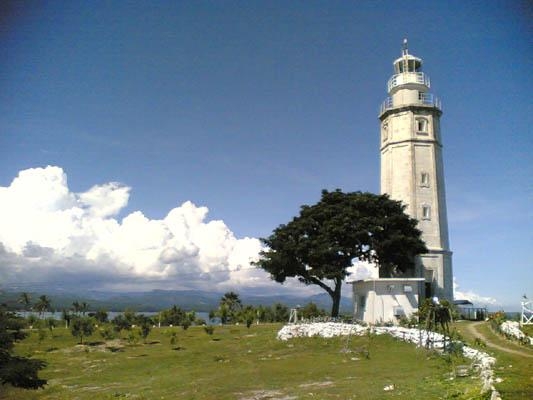
|
| Lighthouse at Liloan |
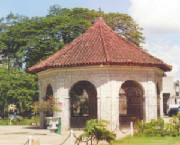
|
| The Kiosk where the Cross of Magellan (below) is enshrined |
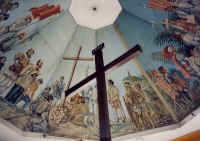
.
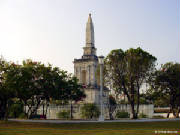
|
| Magellan Shrine & Monument in Cebu |
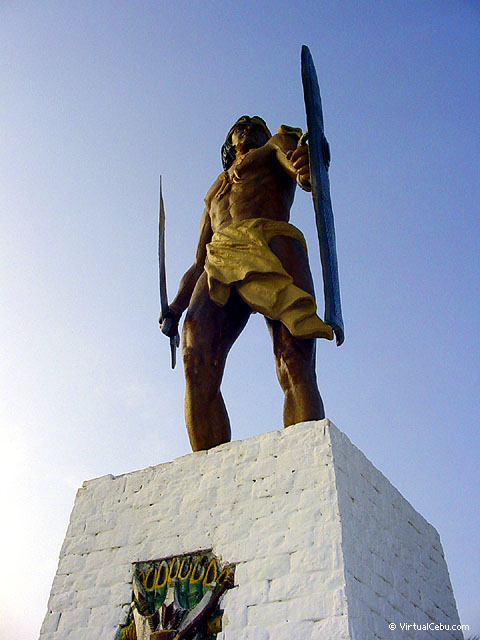
|
| Chieftain Lapu Lapu Shrine & Monument at Mactan Island |
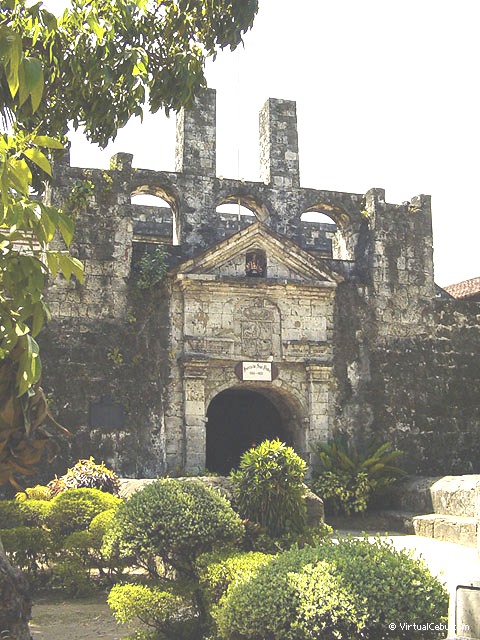
|
| Fort San Pedro in Cebu : One of the oldest in the country |
|
CEBU
Cebu is one of the provinces of the Philippines. It lies to the east of Negros Island; to the east is Leyte and to the southeast is Bohol province. It is flanked on both sides by the straits of Cebu (between Cebu and Bohol) and Tañon
(between Cebu and Negros). Cebu is located between 9°25'N and 11°15'N latitude and between 123°13'E and 124°5'E longitude
in the center of the archipelago.
Cebu Island is a long narrow island stretching 225 km (140 mi) from north to south, surrounded by 167 neighboring
smaller islands, that includes Mactan Island, Bantayan, Daanbantayan, Malapascua, Olango and the Camotes Islands. Of the hundreds of small islands some are uninhabited which make them the targets of adventure-seeking
tourists.
Cebu is known for its narrow coastlines, limestone plateaus, and coastal plains, all characteristics
of a typical tropical island. Cebu also has predominant rolling hills and rugged mountain ranges traversing the northern and
southern lengths of the island. Cebu's steep mountains reach over 1,000 meters. Flat tracts of land can be found in towns
of Bogo, San Remigio, Medellin, and Daanbantayan at the northern tip of the province.
Its capital is Cebu City, the oldest city in the country, which forms part of the Cebu Metropolitan Area together with 4 neighboring cities Mandaue City, Lapu-Lapu City, Talisay City, Danao City and 8 other municipalities. Cebu is served by Mactan-Cebu International Airport in Mactan Island, thirty minutes drive from downtown Cebu City.
Cebu is one of the most developed provinces in the country and the main center of commerce,
trade, education and industry in the central and southern parts of the archipelago. It has five-star hotels, casinos, white
sand beaches, world-class golf courses, convention centers, and shopping malls. The UK-based Condenast Travellers Magazine
named Cebu the 8th best Asian-Pacific island destination in 2005, and 7th in 2004.
|
Cities
|
|
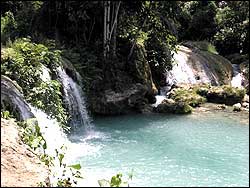
.
|
SIQUIJOR
This is the Island-Province that evokes an imagery of the supernormal- commonly believed to be where people
still practice the "black arts", magic, witchcraft, and sorcery!
(The other island in this Region that is well equally known for the same bewitching reputation is the island
of Bantayan in northern Cebu).
|
.
|
|
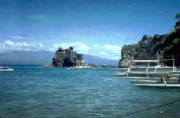
|
| Approaching Apo Island from the town of Zamboanguita in Oriental Negros |
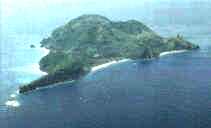
|
| Aerial view of Apo Island |
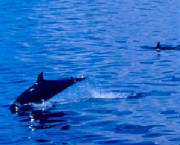
|
| Whale & Dolphin Watching at Bais City every summertime |
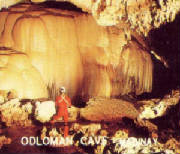
|
| Caving inside the Odloman System- reputedly the 2nd longest cave system in the country |
.
|
ORIENTAL NEGROS
The other side of the Sugarland...!
|
.
|
|
 |
|
|
|
.
DISCLAIMER:
AdventureTravel-Philippines, one
of the major Programs being operated by xxxx and duly represented by its author, disclaims any and all responsibility
or liability for the accuracy, content, completeness, legality, reliability, or operability or availability of information
or material, or any responsibility for the deletion, failure to store, misdelivery, or untimely delivery of Messages, in
this website.
It
further disclaims any responsibility for any harm resulting from downloading or accessing any information or material
through the website.
AdventureTravel-Philippines.tripod.com web site and the information
contained therein, are provided on an "as is," basis, and the Author hereby disclaims all warranties or
conditions of any kind (whether express, implied or statutory), including without limitation the implied warranties of title,
non-infringement, and fitness for a particular purpose. Without limiting the foregoing, AdventureTravel-Philippines.tripod.com
does not promise or warrant to you that any aspect of the web site and system will work properly or will be available continuously.
NO LIABILITY:
In no event shall the Author be liable to any party for any loss or damage, including but not limited to lost
revenues or profits or special, indirect, incidental or consequential damages (howsoever arising, including negligence) arising
out of or in connection with this website.
TEXT
& PHOTO MATERIALS: Unless otherwise noted, all text
information and related links are those of Wikipedia Free Encyclopedia and likewise, photographs and
illustrations viewed herein this website have been provided courtesy of the Department of Tourism and allied-Agencies
for promotional purposes.
|
A HomeBased Travel Company * 201 cor. N Laurel & E Arch Streets * Fleetwood
* PA * 01234, U.S.A.
Copyright 2006 (c) All Rights Reserved
|
|
|
 |

